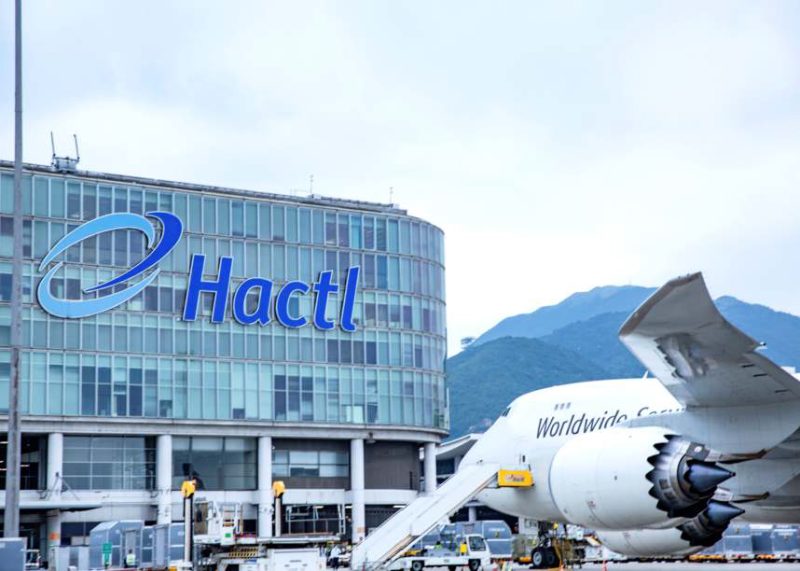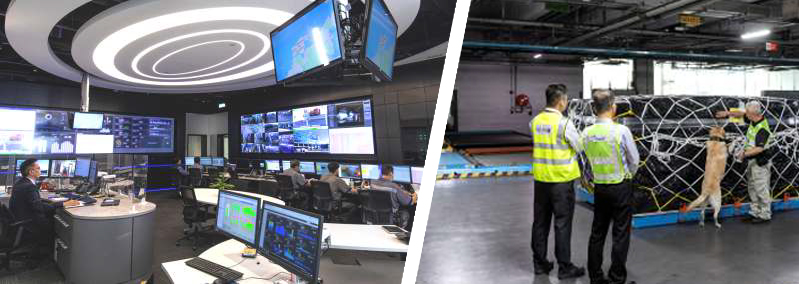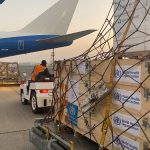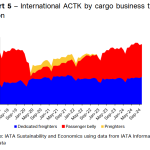Hactl: The Heartbeat of Hong Kong's Air Cargo Hub
Operating since 1976, the company’s services extend to over 100 airlines and 1,000 freight forwarders worldwide, making it a vital player in the global air cargo network.
By Mohammed Irshad
As we look ahead to 2024 and beyond, there is no change to our long-term policy of investment in innovation, led by our Performance Enhancement team. It is admittedly ever more challenging to find new opportunities to further enhance our operations, but we continue to try. Equally important, our every action and decision are now taken with an eye to sustainability, and this is now enshrined in our culture through our Sustainability Strategy Framework.”
At the heart of Hong Kong’s bustling aviation hub lies Hong Kong AirCargo Terminal Limited (Hactl), a name synonymous with efficiency, innovation, and excellence. Operating since 1976, the company stands as the leading air cargo terminal in Hong Kong, offering the most comprehensive and efficient ground handling services with state-of-the-art facilities.
Born to optimize the restricted cargo space at Hong Kong’s former Kai Tak Airport, Hactl has evolved to support the city’s ambition to become a world-class cargo hub. Over the past decades, the company has meticulously crafted a proud history marked by substantial investment, continuous innovation, rich experience, and a commitment to industry best practices.
Recognized as the world’s largest independent handler at the Hong Kong International Airport – the global pinnacle of air cargo hubs – Hactl sets the gold standard by which the industry measures itself. Handling almost 40% of all air cargo traffic flowing through this international nexus, the company not only creates the framework for cargo management, but also clears the path for air freight to become more intelligent, efficient, and sustainable in the future.
Hactl’s SuperTerminal 1, stands as the world’s single largest multi-level air cargo terminal with a designed capacity of handling up to 3.5 million tons every year. Boasting massive handling systems that represent the epitome of automation and efficiency, SuperTerminal 1 is evidence of Hactl’s commitment to providing state-of-the-art facilities. Accredited under every relevant industry standard, the terminal accommodates every type of cargo and aircraft.
Hactl provides a true one-stop shop, offering comprehensive services such as terminal handling, ramp handling, crew transport, documentation, charter flight support, and value-added logistics services. Hactl’s services extend to over 100 airlines and 1,000 freight forwarders worldwide, making it a vital player in the global air cargo network.
In addition to physical cargo handling, freighter ramp handling, documentation handling, and crew transportation, Hactl provides unique multi-modal service between Hong Kong and mainland China through its wholly-owned subsidiary Hacis.
At the heart of SuperTerminal 1’s operation is COSAC-Plus, the latest generation of Hactl’s air cargo management system. This cutting-edgetechnology seamlessly links forwarders, airlines, and regulatory bodies,providing unparalleled data flows and visibility of cargo status.
At the forefront of development, Hactl adopts cutting-edge technologies, Orchestrating a transformative symphony in the global transportation of goods. From automated guided vehicles gracefully navigating through warehouses to state-of-the-art software optimizing21every step of the logistics chain, Hactl not only envisions but actively engineers a future where air cargo is synonymous with intelligence, velocity, and sustainability. Air Cargo Update had the privilege of engaging in an insightful conversation with Joanna Li, Executive Director – Commercial and Business Development of Hactl. Here is an exclusive glimpse into the visionary perspectives and strategic insights that propel Hactl to the forefront of the air cargo industry.
As we step into the new year, could you provide insights into how 2023 unfold for Hactl? What were the key achievements, challenges, and pivotal moments for the company during the past year?
2023 was a challenging year for the air cargo industry as a whole, impacted by geo-political issues such as Ukraine and Israel, and trade tensions between major economic powers. At Hactl, we have seen steady improvement throughout the second half year, buoyed up by increasing e-commerce activity. We are still expecting 2024 to see a return to modest underlying growth.
How does Hactl’s use of Automated Service Kiosks (ASK) improve air cargo operations, and what’s next in your digitalization journey?
The ASKS are digitizing what was a paper-based, manual process. With large and constant volumes of visitors collecting cargo from Hactl, anything we can do to speed up the process is good for customers and relieves potential congestion on the site. The high-tech features of the ASKs also provide a more robust layer of security since there is no human involvement in scrutinizing and matching documents to the presenting individual. This is a technology that is already used in other government applications. Other processes and services will be added progressively to the kiosks’ capabilities. At this moment, we are also studying various projects involving the use of Al to improve our work processes across the board, and thus efficiency.
How does Hactl’s partnership with Aerovision Technology enhance safety and reliability in Hong Kong’s air cargo industry?
We are looking at all possible means of eliminating the risk of fires from lithium-ion battery shipments. We introduced sniffer dogs in 2023 to detect any possible undeclared shipments, and this new intelligent thermal
system further strengthens our precautions by detecting any suspicious temperature variances that could indicate batteries are overheating inside a built-up ULD and in danger of causing a fire. It is far better to eliminate any potential problem on the ground before cargo is loaded and flies.
Hactl has made a public commitment to the Science-Based Target initiative (SBTI). What specific carbon reduction targets have been set, and how do these align with the goals of the Paris Agreement?
Hactl has committed to reduce absolute scope 1 and 2 GHG (greenhouse gas) emissions by 50.4% by 2030, from a 2018 base line, in line with the 1.5°C trajectory for limiting global temperature rises put forward at the Paris Agreement. The company also commits to reduce absolute scope 3 GHG emissions from purchased goods and services, fuel- and energy-related activities, waste generated in operations, employee commuting and downstream leased assets by 50.4% within the same timeframe. The target boundary includes land-related emissions and removals from bioenergy feedstocks.
The Science Based Targets initiative (SBTI) is a global body enabling companies and financial institutions to set ambitious emissions reduction targets in line with the latest climate science. The SBTi’s goal is for businesses across the world to support the global economy in halving emissions before 2030, and achieving net zero before 2050.
Among the many measures Hactl has employed, or will implement, to achieve its SBTi targets, are replacing internal combustion-powered vehicles and ground support equipment (GSE) with electric versions; procuring Renewable Energy Certificates (RECs); increasing the use ofenergy-efficient lighting and heating, ventilation and air conditioning (HVAC) systems; working with suppliers to reduce Hactl’s upstream emissions, especially from purchased goods and services; implementing digital management systems to eliminate paper use; and devising innovative ways of diverting wood, paper, plastics, and mixed waste from landfill.
Hactl signed an agreement with CLP to purchase Renewable Energy Certificates. How has this partnership influenced the sustainability of your operations, and are there plans to expand the use of renewable energy in the future?
The agreement covers six years commencing in August 2022, and will be equivalent to a total reduction of around 18,000 tonnes of carbon emissions associated with electricity (based on the carbon intensity of the electricity sold by CLP Power in Hong Kong in 2021). Hactl has become the largest purchaser of CLP RECS in the airport community. Each unit of electricity in a REC represents the environmental attributes of electricity that are either generated or purchased by CLP Power from local renewable energy sources, including solar power, wind power, and landfill gas projects.
With its purchase of RECS, Hactl reduces its carbon footprint, demonstrating its continued commitment to renewable energy. We continue to invest in new ways to support our overall aims but, while we wait for further new technology to become available to us, this purchase of CLP RECS provides us with an immediate and highly -effective method of supporting the generation and use of clean energy.
Hactl mentions having a world-class Green Terminal aligned with the United Nations’ Sustainable Development Goals (SDGs). Could you provide specific examples of how this commitment is reflected in your day- to-day operations and overall business strategy?
The 17 UN SDGs are closely reflected in Hactl’s recently introduced Sustainable Strategy Framework, which informs every aspect of the company’s operations and decision-making and sets standards and goals for staff and suppliers. Staff and visitors are constantly reminded of the SDGs, which form the basis of interactive displays and quizzes within Hactl’s office stairwells.
Recent examples of Hactl following the SDGs are its New Life for Old Uniforms initiative, which saw 8000 unused, outdated uniforms converted to useful strong tote bags and cute teddy bears; and its sponsorship of a campaign to achieve workplace recognition of and support for, the challenges of menstruation for female workers. The campaign also includes a series of educational activities to promote menstrual equity in the community.
How is Hactl strategically positioning itself to capitalize on the growing digital global economy within the air cargo industry, and could you outline specific initiatives the company is implementing to strengthen its role in the evolving digital landscape?
We have long felt that digitization of air cargo processes is vital to thefuture efficiency of the industry, and to securing its place in e-commerce supply chains where digital data flows eliminate delays and errors, andprovide the transparency and visibility demanded by end customers.Hactl and its subsidiary Hacis have facilitated digital supply chains by providing integration with partners’ systems, and by systematically eradicating all paper-based processes.
This paid a major dividend during COVID lockdowns, enabling Hactl tocontinue operating with all its office staff working remotely. Among the many examples of digital facilitation are our new ASKS whichelectronically release import cargo and update records without humanintervention; our paperless COSAC-eLoading system which provides digital manifests and aircraft loading instructions that can be updatedand shared in real-time, facilitating late changes to bookings; and our mobile apps which enable collectors of import shipments to pre- register their trucks and receive fast-track services. All data collected by these systems is visible to customers.
How does Hactl strategically enhance supply chain efficiency and address challenges through collaborations in the air cargo industry?
Hactl’s standard service offering is designed to provide its airline customers with competitive, safe, and efficient handling of their flights both through the quality and scope of services. Where additional customization is required, Hactl is always open to discussion and will always accommodate such requests whenever possible. A recent example is the partnership with Qatar Airways on sniffer dogs to detect undeclared lithium batteries in cargo. Initially introduced to address their specific concerns, the service has subsequently been made available to all carriers. Our collaboration with ATL on the thermal detection system mentioned above is also a very recent example of partnerships in the industry driving aviation safety.
A recent example is the partnership with Qatar Airways on sniffer dogs to detect undeclared lithium batteries in cargo. Initially introduced to address their specific concerns, the service has subsequently been made available to all carriers. Our collaboration with ATL on the thermal detection system mentioned above is also a very recent example ofpartnerships in the industry driving aviation safety.
As we look ahead to 2024 and beyond, what strategic priorities and initiatives is Hactl prioritizing to further enhance its position in the air cargo industry?
There is no change to our long-term policy of investment in innovation, led by our Performance Enhancement team, whose job is to seek out inefficiencies and resolve them through tech-led solutions. It is our long-held obsession with optimum performance for our customers that has made a major contribution to the high standing of Hong Kong today, as a global air cargo hub; and we will continue to do everything we can to help the airport maintain its leading role. It is admittedly ever more challenging to find new opportunities to further enhance our operations, but we continue to try. Equally important, our every action and decision are now taken with an eye to sustainability, and this is now enshrined in our culture through our Sustainability Strategy Framework.
















